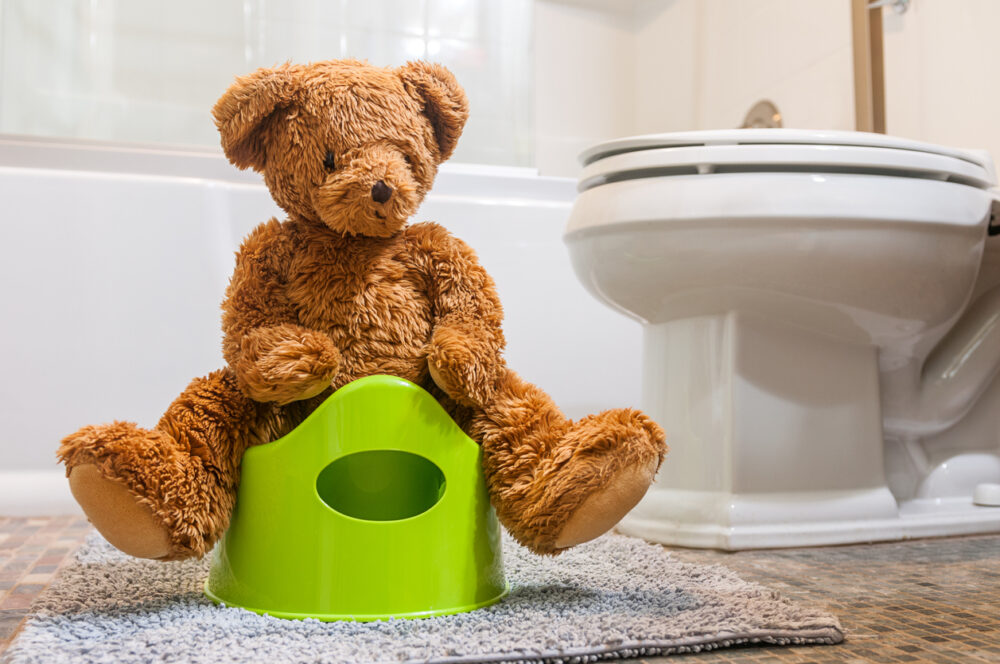Toilet learning – or ‘potty training’ as it used to be known – can be one of the biggest stresses for parents and children. Ditching the diapers/nappies becomes especially fraught when it coincides with starting school for the first time – in particular in FS1 or Pre-KG, when some children may only have just turned three. Arwa Naccho, Nursery Principal and CEO of Green Grass Nursery, explains:
“Starting school often comes with more inflexible expectations, as schools have larger class sizes with fewer adults compared to nurseries, may have also limited resources for handling children who are not fully toilet trained.
“Parents may feel stressed or pressured to meet the school’s expectations that children are fully toilet trained, especially if they are eager to send their child to school at a young age. This pressure may not be helpful for a happy potty-training experience and can cause anxiety in both parents and kids.”
For some children, toilet learning trouble is so stressful and disruptive that it can lead to them being removed school for a temporary period.
This was the case for British expat Andrea Milstone’s little boy Arlo, who started in FS1 at a primary school in Dubai last year, but then deferred his place until FS2, with his parents deciding to put him back into his old nursery for the remainder of FS1. Ms Milstone told SchoolsCompared:
“I didn’t feel my son was ready to start school in terms of potty training. He is a June baby and so had only just turned three when the school year started in August and sometimes children – especially boys – just take a bit longer. His younger sister had only recently been born in June too, so there were lots of transitions at home.
“In other areas of readiness, socially he was mature enough to play well with other children, but I didn’t feel his communication was developed enough to tell the teacher if he was unhappy.
“The potty training turned into an issue for me when I found I was picking up my son most days with soiled underwear. There didn’t seem the staff capacity to help him and I was feeling increasingly worried this was not the right environment for him.
“We took him out of school three quarters the way through the first term . He went back to nursery after the December holiday. Within the first week we knew it was the right decision; the class size was half the size of the school class , the bathroom was in the classroom, it was a smaller environment so less walking around and more nurturing. He seemed happier as he had so much more attention and potty training was so much better.”
But do potty training problems always mean your child isn’t ready for school? And what can parents and schools do to help children who may be struggling? We spoke to the experts to find out.

Arwa Naccho is Principal and CEO of Green Grass Nursery
What does ‘fully toilet trained’ mean?
Any parent who reads the small print in their young child’s offer letter will likely spot something that specifies that children are required to be “fully toilet trained” before staring school. But what does that mean?
Lisa Sherrington Boyd – also known as Principal Lisa or The Potty Queen – is an ex Nursery Principal who offers one-on-one support for families struggling with toilet learning in Dubai. She shares her view:
“I think it’s the school’s responsibility to be clear on what their interpretation of fully toilet trained means. What I believe is ‘fully’ might not be the same as what they believe is ‘fully’. Parents don’t always understand what the school means. ‘Fully’ could mean that they are self-initiating. It could mean they are able to ask for support, able to clean and wipe themselves, and that they are able to release a poop in the toilet. It’s likely those are the kind of skills schools will need because they have lower staff-to-children ratios and the staff are not usually nursery nurses, they’re more education-focused than nursing-focused.”
Do potty training problems mean that a child is not yet ready to start school?
Just because a child might be having toileting accidents at school does not necessarily mean they are not school ready, says Arwa Naccho, Nursery Principal and CEO of Green Grass Nursery:
“Difficulty with toilet training in a young child may or may not be a direct indicator of school readiness. It’s critical to understand that a child’s development involves connected but separate factors for potty training and school readiness. Here are some points to consider:
“Children develop at different rates, and toilet training readiness varies from one child to another. Some children may be fully toilet trained by the age of 2 or 3, while others may take longer. It’s important not to rush the process.
“Physical and Cognitive Readiness: Toilet training requires physical control over bladder and bowel movements, as well as cognitive understanding of the process.
“If a child is having difficulty with toilet training, it may be due to delays in these areas. However, these delays may not necessarily correlate with their readiness for school.
“Emotional and Social Readiness: School readiness encompasses more than just toileting skills. It also involves emotional and social readiness, such as the ability to interact with peers, follow instructions, and adapt to a structured classroom environment. A child who is not yet fully toilet trained may still possess these other important skills.
“In summary, difficulty with toilet training alone is not necessarily a direct indicator that a child is not ready to start school. It’s important to consider various aspects of the child’s development and consult with professionals as needed to ensure they are adequately prepared for the school environment. Patience and understanding from parents and caregivers play a significant role in supporting a child’s development in this area.”
Principal Lisa agrees, adding:
“I don’t know that toileting trouble is a sign that a child isn’t ready for school. They’re probably very capable, but there may have been some challenges with constipation, and that doesn’t deem someone ready or not for school, it just means they are struggling with toileting and that their developmental stage would warrant that they need support with that.
“We wouldn’t say a child wasn’t school ready if they had say some language delays for example; we might say this child has got developing skills. It’s just that if you have a child who struggles with toileting, one of the worst places for them to be is in an FS1 classroom with 20 or more other children and only one or two members of staff.”
View this post on Instagram
How is toilet learning different in a school and nursery?
Most schools will be very accommodating when it comes to toilet learning and will support families experiencing challenges in this area. Often, FS1 or FS2 classrooms in schools will come with toilets attached, which can also make the process a lot easier. However, schools will usually expect children to come already comfortable using the toilet with minimal assistance, and will not be equipped to ‘teach’ toilet learning in the same way as a nursery might. Ms Naccho explains:
“Nursery or daycare settings often have more flexibility when it comes to toilet training. They are generally more understanding of the developmental stages of children and are equipped to handle accidents.
“Starting school, on the other hand, often comes with more rigid expectations, as schools have larger class sizes and may have limited resources for handling children who are not fully toilet trained.
“Children often respond better to a relaxed and supportive environment. When parents and children feel stressed about meeting a deadline, it can create anxiety and potentially delay the process.”
Does a ‘deadline’ for potty training add pressure for parents?
When you’re past the potty learning stage it can be easy to forget how stressful and upsetting it can be for a child who is having accidents regularly. The fact that starting school can represent a ‘deadline’ before which a child must be toilet trained produces stress, which ripples out and puts pressure on the whole family, says Principal Lisa:
“My phone rings off the hook in the first weeks of September. I am not even able to service the number of families who get in touch with me. It’s a bit of a shock.
“It does add extra pressure and I think there is a great deal of miscommunication between parents expressing what their children’s development need is like when they sign their children up for school, and the miscommunication between what they parents are going to find out is the case.
“Sometimes they are surprised to find out that the school doesn’t have a nanny to help children in the toilets. Also, it’s a miscommunication at times from the school and what they do actually mean by ‘fully toilet trained’.
“However it’s not unreasonable to expect a child to be toilet trained by the age of three – it’s a pretty standard age to be toilet trained But you would mostly find children around the world at the age of three being in specific early childhood centres.”
What sort of reaction and support should parents be able to expect from schools when it comes to potty training and possible accidents?
Schools will usually do their best to help families with toilet training issues, but they do still have to focus on other parts of the curriculum too, says Principal Lisa:
“Parents I work with tell me that for the first two weeks schools tend to be very supportive, but after a while there starts to be phone calls home when the child has an accident again, and this often upsets parents. Then it can move into the realm of the parents starting to get very worried and upset if it goes on for much longer than two weeks. Staff and teachers are very supportive the first couple of weeks, but after that they do expect kids to be able manage it themselves because their teachers cannot be clearing up accidents all day; they do have a teaching agenda to get to, which is different.”
Ms Naccho adds:
“In my view, the best approach is to prioritize the child’s readiness over arbitrary deadlines. It may be more beneficial to focus on creating a supportive and stress-free environment for toilet training rather than setting strict deadlines. Ultimately, the well-being and comfort of the child should be the top priority in the process.”
For Ms Milstone, who decided to take her little boy Arlo out of school due to toilet learning issues, the key thing to remember is that all children are different, and you may have to adapt to your own little one’s needs:
“In retrospect, absolutely, we would have kept him in nursery for FS1 and avoided all the stress.
“I think there is pressure to start school earlier than necessary in the UAE. There are concerns that your child may not get a place inFS2 if they don’t start in FS1. Also that they may fall behind if they don’t start school with their peers, as it felt it was the expectation children start school in FS1.
“But I think parents need to take a breath and consider what’s best for their own child.
“In the UK children start school when they are 4 or 5 and summer babies are now given the option to defer by a year so they can start school at 5. This seems a marked difference to some children in Dubai who start school at 3.
“Arlo went back to the same school in FS2 this year and he’s absolutely loving it and thriving – this was the right time for him. Children develop at different stages and it doesn’t mean there’s anything wrong – it’s just important to do what’s best for your child.”
DOS AND DON’TS for toilet learning troubles
DON’T discuss in front of your child
“Please DON’T talk about accidents at the school door at pick-up – don’t talk about it in front of the teacher,” says Principal Lisa. Talking about it in this way may embarrass your child and make them feel ashamed – children pick up on a lot more than you might think.
DO anticipate toilet needs
“Please make sure go to the toilet before going to school, and it might be helpful to go to the toilet before leaving school at pick up time rather than waiting till in the car,” says Principal Lisa.
DO See a paediatrician
Ms Naccho says:
“My advice , if a child is struggling with toilet training at the age of 4 years, it can be helpful to consult with a paediatrician or child psychologist to rule out any underlying medical or developmental issues. These professionals can provide guidance and support tailored to the child’s specific needs.”
Principal Lisa agrees:
“If your child is struggling with toilet training or there is any constipation, it’s vital that you reach out for support. Especially if they’ve got constipation, please see your paediatrician; it’s not something that just goes away on its own by adding in prunes for breakfast. This is something that needs professional support, and I usually work with a doctor, to help them.”
© SchoolsCompared.com. A WhichMedia Group publication. 2023 – 2024. All rights reserved.


























































Leave a Response